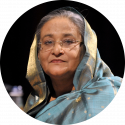SHEIKH Hasina

Prime Minister of the People’s Republic of Bangladesh since 6 January 2009
Predator since 2014 (at least)
Bangladesh, 152nd/180 countries in the 2021 World Press Freedom Index
PREDATORY METHOD: The Digital Security Act, ultimate weapon for imposing self-censorship
The eldest child of Sheikh Mujib, Bangladesh’s independence hero, Sheikh Hasina has been a leading figure in Bangladeshi politics since the early 1980s. For years, she led the opposition to various authoritarian regimes that used violence to persecute journalists. Then her party won the December 2008 parliamentary elections by a landslide, and she took office as prime minister the following month.
Thereafter, she became increasingly more authoritarian and ready to crack down on press freedom. The trend was confirmed in 2014 when her reelection was made all the easier by the fact that the opposition was denied access to the news media. Although she claims to respect press freedom, her hold on power has been buttressed ever since by a refusal to tolerate any criticism.
The Digital Security Act (DSA) adopted in 2018 has rounded off the arsenal that her government uses to impose her views. Packed with deliberately vague wording, it is the ultimate weapon for getting journalists to censor themselves. Online content “liable to disturb public order” is punishable by seven years in prison while “negative propaganda against (...) the Father of the Nation” – Sheikh Hasina’s own father – is punishable by 14 years in prison. In other words, vast, vaguely-defined areas have been rendered completely off limits.
FAVOURITE TARGETS: Reporters who annoy her
OFFICIAL DISCOURSE: Impose “real” facts
“Journalists who do not publish false news need not worry about the DSA,” she said in October 2018 – the DSA being a law that allows the government to determine which news story is “true” and which one is “false.”



